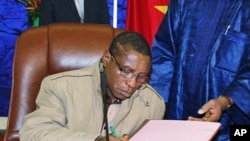Guinea's military leader has agreed to a transitional government leading to elections within six months.
Captain Moussa Dadis Camara has agreed to remain outside the country, continuing his recovery from being shot more than one month ago while a transitional government takes charge in Guinea to organize new elections.
Captain Camara and interim leader Defense Minister Sekouba Konate agreed to the deal during talks in the Burkinabe capital with regional mediator President Blaise Compaore.
Captain Camara will remain in Burkina Faso for the time being, easing concerns that his imminent return to Conakry could jeopardize an interim government and lead to further violence.
General Konate threatened to resign Thursday during a confrontation with members of Guinea's ruling council who were pushing for Captain Camara's immediate return.
The United States and France both believe a transitional authority is more likely to successfully organize elections if Captain Camara does not return to Guinea.
He was shot in the head more than one month ago by the former chief of the presidential guard who says Captain Camara was trying to blame him for the killing of more than 157 protestors in September.
The United Nations says there are sufficient grounds for presuming direct criminal responsibility by Captain Camara for that killing.
Friday's agreement says Captain Camara will remain available to help the players in the transition while he continues his convalescence in Burkina Faso. President Compaore says Captain Camara has shown a great willingness to help the process.
President Compaore says a period of convalescence for Captain Camara will be useful as he has put his trust in General Konate to lead the transition to an interim authority.
The deal calls for a transitional government organized by the opposition coalition of political parties, trade unions, and civil society groups to organize presidential elections within six months. Members of that government and the current ruling military council will not be allowed to run in that vote.
The deal calls for the revision of Guinea's electoral roles, the reorganization of its security forces, and the deployment of regional civilian and military observers.
Guinea's Military Leader Agrees to Transitional Government




